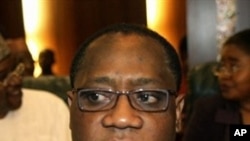Nigeria's finance minister says the new government is determined to confront critical economic challenges, including unemployment and access to affordable credit.
Nigerian Finance Minister Olusegun Aganga says last year's $4 billion central bank bailout of failing commercial banks was courageous. A new Asset Management Corporation has been set up to buy non-performing loans still held by those banks so they can be recapitalized and pay back some of the bailout.
But the bailout also tightened credit, and Nigerian business leaders and consumers say they are having trouble getting loans. When they can, they are paying interest as high as 20 percent.
Two months into the job, Aganga says it is critical that small businesses have access to cheaper credit. The former executive at investment bank Goldman Sachs says that will help improve Nigerian unemployment, which now stands at nearly 20 percent.
"It is even far more worrying that the largest group affected by the level of unemployment is the group between the ages of 15 and 24 or 25, where you have an unemployment rate of about 49.9 percent in the urban region and roughly about 39.7 percent in the rural areas," he said.
Nigeria's central bank has opened a fund of more than $3 billion to help banks refinance loans to manufacturers, airlines, and power generators. Unreliable electricity is one of the biggest economic impediments in Africa's largest oil producer. The country's new president, Goodluck Jonathan, has taken personal responsibility to improve that.
"When you resolve the issue of power, you resolve so many issues, so it's not an economic issue, it's a national issue," said Mr. Jonathan. "And, as you know, the president has decided to chair the committee looking into power and he has promised that before the end of this administration, or by the time his administration completes its session, we would see an improvement in power."
Boosting electricity supply was one of the biggest campaign promises of the late President Umaru Musa Yar'Adua. And he was criticized for failing to deliver before his death last month.
So it is a risk for President Jonathan to closely identify with the issue with less than a year to show results, especially since voters can easily see his progress when they try turn on their lights at night. But if Mr. Jonathan can improve the supply of electricity, political analysts here say, it could be a populist cornerstone to a presidential campaign next year.




